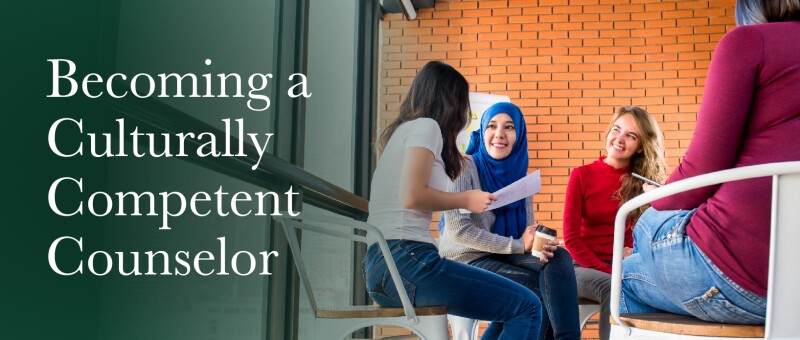A competent counselor is able to work with clients to help them understand themselves and their relationships more deeply, and to use this information to make better, healthier decisions. Basic competency in this field requires a baseline understanding of psychology and therapeutic theory. But the counseling relationship—in Clinical Mental Health Counseling, Military and Veterans Counseling and School Counseling—is as variable as your clients. What happens when a client and a counselor have different cultural backgrounds? Cultural competence in counseling is a crucial factor in ensuring successful outcomes for all patients, and as the U.S. population becomes more diverse, proficiency in multicultural counseling is becoming a critical component in the training of new counselors.
Why Is It Important for Counselors to Be Culturally Competent?
Multicultural competence in counseling refers to a counselor’s ability to garner positive clinical outcomes in cross-cultural encounters with patients.1 In this context, “cross-cultural” can be defined as differences between client and counselor in terms of ethnicity, religion, gender expression, income, disability or other social factors. While this is not to say that counselors and clients have no hope of communicating unless they share a cultural identity, it is important to recognize that building trust between individuals from different walks of life can present obstacles on both sides of the counseling encounter. It is up to counselors to train and be prepared so that they can deliver the best outcome possible, regardless of differences between themselves and their clients.
How Do Cultural Differences Impact the Counseling Encounter?
Psychosocial development is different for people from different cultural backgrounds. Cultures differ in their attitudes toward major life challenges, which means solutions for common disorders are not one-size-fits-all. Even more, certain identities are underrepresented in the counseling profession, which can lead to a lack of trust on behalf of some populations, who do not believe their needs will be reflected in a counseling relationship. The most important first step is to establish trust with a client. Most of the time, by showing awareness of differences and an openness to new understanding, counselors can begin to build trust and a productive relationship with clients.
Cultural Competence Starts at Home
One key way to begin to establish your multicultural competency is to evaluate your own background and beliefs. By starting to understand your own underlying cultural assumptions, you will be training yourself to see your views as just a starting point for your work rather than a default setting shared by all of the people you encounter. Once you have a firm understanding of your own cultural grounding, you should begin to widen your focus on the ways that individuals from different backgrounds view the world. Reading up on the professional and clinical literature can help, as can looking in some unlikely places. Memoirs, for instance, are a great way to increase your understanding of how certain historical events impacted different social groups in ways that may affect their members’ psychology.
Understanding the Historical and Social Context of Multicultural Counseling
According to the American Counseling Association, the most important first step you can take to become a more culturally competent counselor is to learn about the historical and social context behind inequities in the United States.2 Particularly since World War II, when the U.S. population exploded due to immigration, demographics began to change rapidly. Understanding why certain groups have been historically disadvantaged, and understanding the impact this has on development, is key to being able to communicate effectively with clients.
Multiculturalism and the School Counselor
The Ethical Standards for School Counselors laid out by the American School Counseling Association actually require cultural competency on the part of school counselors.3 Education groups recognize the critical importance of school counselors in closing the achievement gap between privileged students and students from culturally disadvantaged backgrounds. With many school counselors dealing with large student populations, it’s important that they develop a flexible and adaptable understanding of the ways counseling techniques can be applied to different students depending on their cultural context. After all, even the structure of counseling is culturally inflected, which means extra sensitivity should be shown toward students for whom seeking help is culturally frowned upon.
Incorporating Competency
Becoming a well-rounded counselor means recognizing that every client will require their own specific therapeutic approach. Multicultural competency isn’t just a tool in the counselor’s toolbox, it is a point of view that can be seamlessly incorporated into your counseling practice. Because of this, William & Mary’s Online Master of Education (M.Ed.) in Counseling program includes multicultural competency as a running theme throughout all of its coursework, as well as courses, like Theory and Practice of Multi-Cultural Counseling that deal directly with the challenges and opportunities of cross-cultural client/counselor relationships.
Led by a faculty of experts, the W&M student experience integrates the concepts and skills associated with social justice and cultural responsiveness into its Online M.Ed. in Counseling program. Explore the robust curriculum, including paths in Clinical Mental Health Counseling, Military and Veterans Counseling and School Counseling, and learn how our program can help you become a more effective counselor. Schedule a call with an admissions outreach advisor today.
- Retrieved on March 20, 2018, from ncbi.nlm.nih.gov/pmc/articles/PMC2793275/
- Retrieved on March 22, 2018, from counseling.org/resources/library/ACA%20Digests/ACAPCD-24.pdf
- Retrieved on March 22, 2018, from counseling.org/docs/default-source/vistas/school-counselor-multicultural-self-efficacy.pdf?sfvrsn=4


